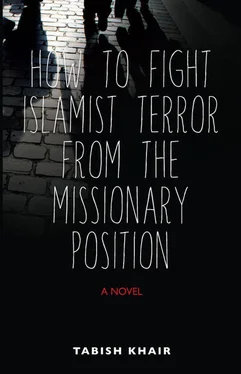When we exited the overpriced, under-spaced flat we had rushed to investigate, dodging the brochures showered on us by another property agent, and came out on the street, Karim’s taxi was still parked by the curb. Karim was standing there, rolling a cigarette. Ravi went over for a farewell chat and a final exchange of nicknames of distant cousins. I stayed where I was. A cold wind was blowing, reducing audibility. I could only catch a word or two of their conversation. I could see it was getting chummier and chummier. Or Ravi was, as Karim was a friendly but reserved man. Very soon Ravi was clapping Karim on his shoulder. Then the two of them did a kind of Eid Mubarak hug.
Ravi came back to me with a broad smile on his handsome Bollywood-star face. I have never met anyone with a broader smile than Ravi’s, when he decides to let it rip. He did that day. Guess what, bastard, he said to me. Bastard was a term of affection between us, as it usually is in the subcontinent between men who share a Catholic missionary-school education. Guess what, bastard, Ravi said, I have found us a fucking flat.
As I blinked up to him in wonderment—I am not short, but Ravi is a bit over six—he explained: Karim Bhai there, he has rooms to rent in his flat, and I think we should take them.
Ravi’s enthusiasm faltered when we entered Karim Bhai’s flat. Yes, it was that flat: the flat that was mentioned—in lieu of our legally protected names—in all the tabloids when it happened. As you probably know from the newspapers, the flat was well situated, on the third floor of a building on a quiet street. It had a small balcony that looked out over the street, onto a park. You have probably seen photos of the flat and the building from so many angles. No, location or convenience was not the problem. The problem was that it was a two-bedroom flat. Two bedrooms, a larger living room, with a small lobby between them, a kitchen with space for a table with four chairs, and a cramped bathroom and toilet.
In his windswept conversation with Karim, Ravi had got the impression that there were two rooms to rent. Now, he looked down at Karim—the shortest of the three of us—and said, with just a touch of irritation, “Karim Bhai, we are in the humanities, I know, but we are not completely gay.”
Karim looked like he had been slapped. He was not a man who joked about too many things.
“Allah forbid,” he said, slapping himself lightly on both cheeks, the first time I had seen this traditional gesture of repentance performed anywhere except in a historical Bombay flick, “Such an indecent thought would never cross my mind, Ravi Bhai.”
Karim peered at us from wide staring eyes. He had baby eyes: round and a bit dilated, as if in surprise, with slightly darkened edges. In all the months we shared his flat with him, I could never determine if the darkened edges were natural or due to the application of kohl that, though uncommon now, was once widely used by men in north India. I knew Ravi had gone too far. Karim was not from the kind of circles where sexuality was a matter of choice—or irreverence. I hastened to explain to Karim that Ravi’s joke was his way of mentioning that we wanted to rent separate rooms.
“Separate rooms. Of course, yes, of course. See,” said Karim, with relief writ large on his face, “see, there are two bedrooms.” He gestured towards the doors of the bedrooms on the other side of the small lobby.
“But you, Karim Bhai? Don’t you live here too?”
“Yes, yes, I do,” said Karim Bhai. “I live in the third room.” He gestured at the living room.
We could now see that clothes hung in the living room, ready on hangers. There was no bed in it. But there was a large sagging resin-covered sofa on which were piled sheets and pillows. Evidently, unlike us, Karim Bhai came from those sections of the working class that are accustomed to sleeping regularly on sofas.
And accustomed he was, as we were later to find out. He had been sleeping on the sofa for years now, ever since he rented out the bedrooms for the first time. This was soon after he had bought the flat, from a bankruptcy sale, and restored it with his own hands. That he rented out the rooms for money was something he did not hide from us. That he needed the money was also something he was not ashamed to confess. But the purpose for which he needed the money remained, alas, a secret to us until the last moments of the crisis that broke over our heads and so exercised the Danish media and politicians for a few weeks.
At that moment, I recall, Ravi asked him about the previous incumbents.
“Oh, they just left a week ago,” said Karim Bhai evasively.
“Some of their things are still here; they will collect them some day.”
Given Ravi’s aunty-like probing, it was soon revealed, over cups of Darjeeling tea that Karim Bhai brewed for us in the kitchen, that the previous renters had been a family of refugees from ex-Yugoslavia: the parents were old Tito-supporters and die-hard atheists, despite being Muslims; the daughter, at eighteen, had discovered Islam through Karim Bhai and the local mosque. When she wanted to marry a young Muslim man from Somalia, whom she had met at the same mosque, the parents threw a tantrum. More, hinted Karim Bhai disapprovingly, because of the man’s intense faith than because of his color. The girl married her lover and moved in with him. The parents moved out soon afterwards. The things that lay about in Karim’s flat were mostly the girl’s. She had promised to collect them.
This story gave Ravi cause for pause. He looked at me thoughtfully, sipping tea from the flowery china cup that had probably been bought in Bazar Vest or carted back from India, for no Danish supermarket could have stocked such a gaudy non-European brand. I knew what he was thinking. But I was not going to help him out. This was his idea. Let the bastard sweat it out.
Then Ravi made up his mind and decided to grab the bull by the horns.
“You see, Karim Bhai,” he began hesitantly, “we like your place, and the rent you have quoted suits us. But you see, you are like an older brother, and we would not like to cause you pain. We are, how shall I put it, single men, and you know that single men sometimes like to be visited by women and open a bottle of wine for inspiration. Our own Ghalib wrote, and that was probably when he was no longer so young, jo haathon mein jumbish nahin…”
Karim Bhai ignored the bit about women and Ghalib. He never liked to say anything about women, if he could help it, as we discovered later. But he answered Ravi’s question.
He replied: “What you do in your rooms is between you and Allah. But not a drop in my room, if you call me your brother. In my room, I pray.”
That is how we came to rent Karim Bhai’s flat.
Karim Bhai folded up his prayer mat and put it in the corner where it always stood. Ravi observed with interest. Within a week of having moved into Karim’s flat, Ravi had convinced him of his desire to learn the Muslim prayer. It was a desire he had revealed to me months ago, only to be rebuffed by my laughter and the news that I had not said the prayer for almost two decades. Even in the days when I accompanied my father to Eid prayers, twice a year, I did my genuflections by adhering to the precedence set by those around me. When the person to the left bowed, so did I. When the person to the right stood up, so did I. For years I admired the people praying around me for their ability to remember the intricate and shifting maneuvers of the Islamic prayer, in its many combinations and forms. Then, at the age of sixteen or seventeen, following a bet with an older cousin, I discovered that my admiration was at least a bit misplaced. The cousin had suggested that most people did the Eid prayers by copying their neighbors. Try it out, he said; do the wrong thing just a second before, and you will see. I did. I saw. Half the row to my left and at least three people to my right copied my deliberate mistake before they corrected themselves.
Читать дальше












